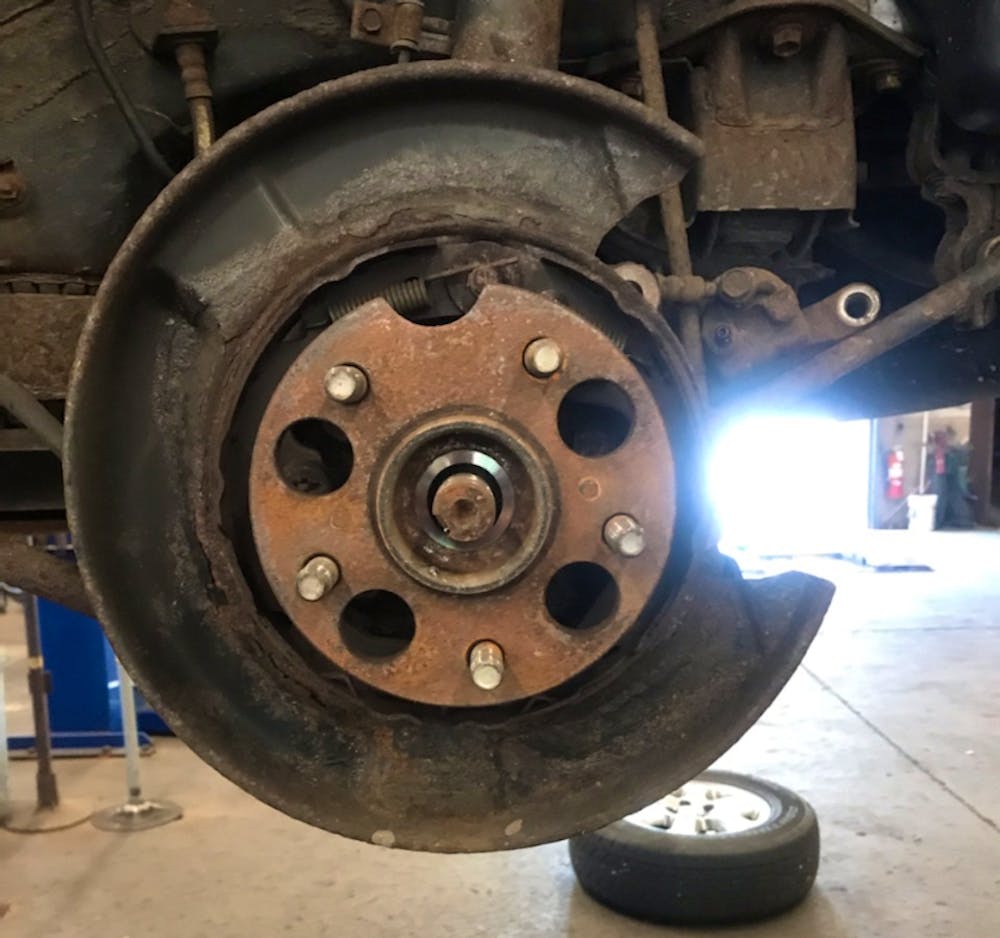Fixing wheel bearings can cost between $350 to $650 on average. Dealing with car repairs can be stressful and time-consuming, not to mention the costs involved.
One of the common issues car owners face is fixing wheel bearings. Wheel bearings are crucial components, as they support the weight of the car while allowing the wheels to rotate. However, they can wear out over time, from constant use and exposure to the elements.
If you ignore the signs of damaged wheel bearings, it could lead to serious problems, such as accidents, damaged wheels, and even a total brake failure. In this article, we will discuss the cost of fixing wheel bearings, factors that affect the cost, and the signs that your bearing needs fixing.

Credit: www.cartalk.com
Understanding Wheel Bearings And Their Importance To Your Vehicle
What Are Wheel Bearings?
Wheel bearings refer to a set of small metal balls that help your car’s wheels to spin smoothly on the axle. They serve as a connection point between the wheels and the suspension system of your vehicle.
When a wheel bearing is working correctly, it allows your car’s wheel to rotate without any friction and noise.
Why Are They Important To The Safe Operation Of Your Vehicle?
The wheel bearings are crucial for the safety and performance of your car in several ways. The following are the reasons why wheel bearings are vital for your vehicle’s safety:
- Your car’s wheel bearings support the entire body weight of your vehicle; therefore, they should be in good condition to ensure stability, control, and maneuverability.
- Worn-out wheel bearings may cause your wheels to wobble or shake, making the vehicle challenging to handle and dangerous on the roads.
- Faulty wheel bearings may affect your vehicle’s braking or steering ability, putting you and other road users at risk of accidents.
How Do You Know If Your Wheel Bearings Need To Be Replaced?
Identifying when to replace your wheel bearings is essential to avoid expensive repairs and potential accidents. Here are the primary signs to watch out for:
- A grinding or humming noise coming from your car’s wheels.
- Your vehicle’s steering wheel feels loose or shakes while driving at high speeds.
- Uneven tire wear or wobble when driving.
- The abs warning light turns on.
If any of these symptoms happen, have your car inspected by a qualified mechanic to determine whether it’s the wheel bearings that require replacing.
Bearing Related Problems That Can Occur If Left Unchecked
Ignoring worn-out wheel bearings can result in more extensive and expensive repairs down the line. The following issues may occur if you don’t fix your wheel bearings on time:
- Excessive heat buildup: Over time, heat buildup due to worn-out bearings can cause serious damage to the wheels’ hub assembly, leading to more significant problems, such as warped rotors or spindle damage.
- Wheel dislocation: If your wheel bearings fail, the entire wheel assembly can break away from your vehicle, causing significant damage or accidents.
- Failure in other car components: Bad wheel bearings can affect the stability of other car components, such as brakes, suspension, and steering, ultimately leading to costly repairs.
Taking care of your wheel bearings is vital for your vehicle’s safety, performance, and longevity. Regular inspection and replacement of bad bearings is a cost-effective way to avoid expensive repairs and accidents in the future.
Factors That Affect The Cost Of Replacing Wheel Bearings
Wheel bearings are an essential component of a vehicle’s suspension system. They are designed to allow the wheels to rotate freely while bearing the weight of the vehicle. However, over time, they can wear out or fail, which can lead to several problems like uneven tire wear, steering issues, a shaking steering wheel, or a grinding noise.
If this happens, it’s crucial to have them replaced. The cost of replacing wheel bearings varies depending on the following factors:
Type Of Vehicle And Wheel Bearing
The type of vehicle and wheel bearing are significant factors that affect the cost of replacing wheel bearings. Some vehicles have complex suspension systems, making them more challenging to work on and increasing the labor hours required. Other vehicles may have larger, more expensive wheel bearings, which can increase the cost of parts.
Therefore, vehicles with complex suspension systems or larger wheel bearings will typically cost more to replace.
Labor Costs
The labor cost is another critical factor in determining the overall cost of replacing wheel bearings. The cost of labor can vary depending on the mechanic’s expertise, geographic location, and the complexity of the job. An experienced and highly skilled mechanic may charge more for labor, but they are more likely to do a better job than a less experienced mechanic.
A job that takes more time to complete, such as one that requires the removal of other components, will also increase the labor cost.
Replacement Parts And Their Quality
When it comes to replacing wheel bearings, there are several options to choose from. Oem (original equipment manufacturer) parts are the most expensive but are often considered the best quality. Alternatively, you can purchase aftermarket parts that are less expensive but may not be of the same quality.
It’s essential to select high-quality replacement parts that are durable and built to last, as this will prevent unnecessary repairs and replacements in the future.
Additional Repairs And Maintenance That Might Be Needed
In some cases, additional repairs and maintenance may be required when replacing wheel bearings. For example, replacing the wheel bearings may require the removal of other components, such as the brake calipers or rotors. If these components are old, worn out, or damaged, it’s crucial to replace them to avoid further damage or safety concerns.
Additionally, the mechanic may recommend other maintenance services if they notice anything else that requires attention to prevent future problems with your vehicle.
Several factors affect the cost of replacing wheel bearings, including the type of vehicle and wheel bearing, labor costs, replacement parts, and additional repairs and maintenance. It’s essential to work with an experienced and trustworthy mechanic to ensure a quality repair job and avoid future problems with your car.
Frequently Asked Questions Of How Much Does It Cost To Fix Wheel Bearings
How Do You Know If Your Wheel Bearings Need To Be Replaced?
You’ll hear a groaning sound from wheels. Check for play in the wheel and vibration.
How Long Can You Drive On Bad Wheel Bearings?
It is not advised to drive on bad wheel bearings as it can cause damage to other parts.
How Much Does It Cost To Replace Wheel Bearings?
The cost of replacing wheel bearings varies depending on make and model. Average cost is around $500.
Can You Replace Wheel Bearings Yourself?
Replacing wheel bearings can be a difficult process and requires specialized tools. It is recommended to have them replaced by a professional.
Conclusion
After assessing all the factors involved in fixing wheel bearings, it is safe to conclude that the cost varies greatly. The cost is determined by factors such as the make and model of your vehicle, the location of the repair shop and the extent of the damage to your wheel bearings.
It is important to ensure that you use a reputable and experienced mechanic to fix your wheel bearings to avoid future problems and costs. Regular maintenance can also go a long way in helping to prevent damage to your wheel bearings, saving you money in the long run.
As with any repair, it is always important to balance cost with quality to ensure that you get the best possible service for your money. Overall, addressing issues with your wheel bearings as soon as they arise can save you a lot of money and help keep you safe on the road.
